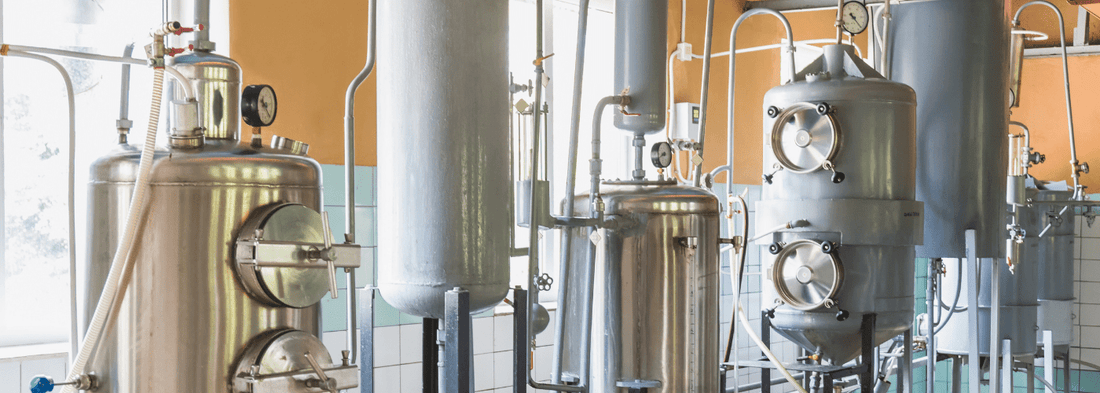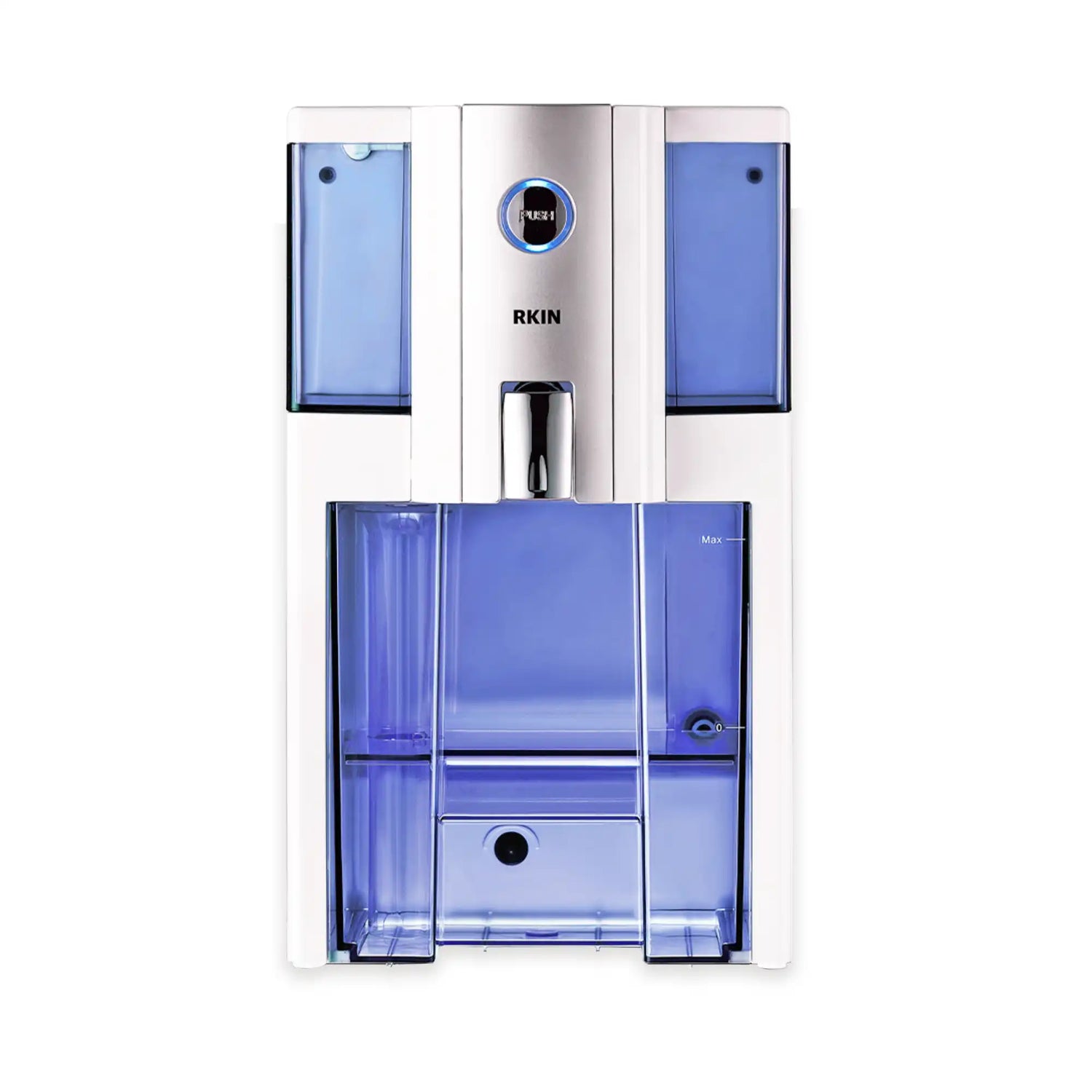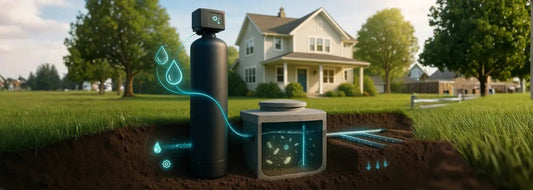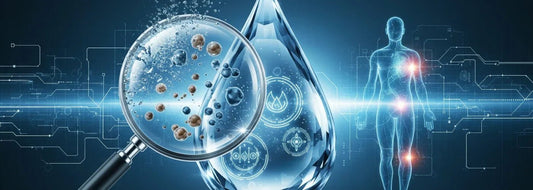
What is a Water Distiller
Share
It is a piece of equipment that is used to produce high-quality water through the process of Distillation.
Distillation is the process of removing contaminants such as heavy metals and salts that boiling water leaves behind. In this process, the water is heated up to its boiling point and the steam is collected. The steam will then be converted back into its liquid form leaving all the contaminants behind and making the water pure.
There are a lot of water distillers available in the market with different sizes to choose from that will fit your countertop. All of them will remove approximately of the contaminants found in your water. Having water distillers will save you a lot compared to bottled water purchases. Individual bottled waters usually costs a dollar or more when purchased unlike having a water distiller. A gallon of water when distilled at home averages 25 cents, and the initial purchase of a distiller will cost you between 400 to 650 dollars, but it will surely pay for itself quickly. You no longer have to buy bottled waters and spend hundreds of dollars every year on the wasteful product when there are healthier alternatives.
The Importance of Having Clean Water
Water that has been distilled offers extraordinary benefits to the human body. The quality and quantity of the water you drink is linked to the quality of your tissues, how they perform, as well as their resistance to injuries and diseases. Water acts as a magnet. It picks up rejected, unusable, discarded inorganic minerals and eliminates them from the body. The body now no longer has to process any inorganic wastes that are sometimes found in tap water and can perform efficiently without having to filter out and remove any unwanted and useless waste. This results in better absorption of key vitamins and minerals within the body.
History of Water Distiller
Distillation is as old as the earth. The distillation phenomenon happens in nature called “Hydrologic Cycle”. This natural distillation method is where the water found on the surface of the earth is heated by the sun. Once heated water reaches evaporation point, it becomes steam – water’s third physical form without any contaminants, to form clouds. When atmospheric temperatures drop, clouds – vaporized water cools and water returns back into its natural state which is liquid droplets aka rain. The water droplets drop to the earth’s surface, as snow or rain (precipitation) and the cycle repeats again. This cycle is also known as Nature’s Air Purification system because the water that falls in the form of rain or snow collect from the air dirt and air pollutant particles bringing them to the ground – cleaning the air.
When did humans start understanding and using distillation?
In ancient Greece, a form of distillation was used by sailors. They used to hang sponges over pots of boiling sea (salt) water. They collect water by squeezing out the sponges. The sailors found out that the water squeezed out from the sponges was not salty and was drinkable. That’s why they did it.
Today, water distillers are simply man-made forms that replicate nature’s “Hydrologic Cycle” method of producing pure water. Distillation is considered to be an effective broad spectrum water treatment method and can remove several kinds of contaminants including biological contaminants such as viruses and bacteria.
How Does a Water Distiller Work?
In producing Distilled Water, there are several steps to complete the process:
- In the boiling chamber of a Water Distiller, the tap water is fed
- By means of a heating element, the water in the boiling chamber is heated
- Steam or water vapor is produced once the water in the boiling chamber starts to boil
- Through a built-in vent, the steam rises up from the boiling chamber and gases are discharged
- Scales or hard deposits are retained in the boiling chamber. These are the salts and minerals in the water.
- The steam then enters a condenser where it will be cooled by a fan or cool water. The condenser looks like a coiled tube
- As the vapor condenses, drops of water are formed. Some distillers have a carbon filter which removes any gases that remained in the drops of water
- The collection of Distilled Water is done in a separate container or tank
What Is Distilled Water Used For?
Approximately 70% of the earth is covered with water, but most of it is not potable and is not fit for everyday use. Distilled water is water that has been highly purified. It is free from all kinds of harmful substances like bacteria and debris. And because of this quality, it has many uses and benefits. These include:
- It is used in various industries and chemical and biological laboratories where highly purified water is essential. Sometimes, in cases where an exceptionally high degree of purified water is required, double distilled water is used.
- It is used in ships, particularly in nuclear-powered ships, as a coolant. Here, seawater is desalinated through the process of distillation. This water is also used by the crews of the ships for drinking.
- It is used during surgical procedures where clean water is a must to prevent any kind of infection. For the very same reason, it is also used to wash and clean wounds.
- Lead acid batteries used in vehicles like cars and trucks require a top-up of water at regular intervals of time. Presence of various ions in plain tap water can cause damage to the battery and lead to a reduction in its lifespan. Distilled water, free of such ions, is commonly used in such batteries.
- It is used for making various drinks by many beverage manufacturers to ascertain a high-quality product in terms of both taste as well as purity.
- It is often preferred as a liquid of choice in different cooling systems such as radiators. Minerals and ions present in untreated water tend to build up in cooling systems causing premature failure and excessive energy consumption.
- It is used in aquariums to give the aquarium fish a longer life.
- It is used in steam irons for pressing clothes. The absence of any mineral substances in distilled water enables the iron to function properly for a longer period of time.
- It is excellent for the skin as it is devoid of any harmful dissolved substances, and helps in blocking of microscopic pores on the facial skin.
Myths and Misconceptions about the Benefits of Drinking Distilled Water
Perhaps you have been drinking distilled water for years and now you are getting worried after hearing all those misleading messages about distilled water. Don’t worry, here are some myths being perpetrated on the web and the truths behind them:
MYTH: Distilled Water becomes acidic when in contact with air because it is an active absorber, thus absorbing carbon dioxide making it acidic.
FACT: This statement IS true! There is a direct ratio between the CO2 in the air and water, also dependent on the ion concentration of the water. You can use this ratio to calculate the pH. The amount of CO2 absorbed is very very minimal and has almost no effect on the body’s pH. You should be more concerned with your intake of calcium and magnesium, along with other alkaline foods, as this help to maintain the body’s chemical balance. The amount of CO2 in a glass of distilled water adding to its acidity is less than what your body breathes out in one breath, making this argument insignificant.
MYTH: Cooking foods in distilled water pulls the minerals out of them and lowers their nutrient value.
FACT: Cooking any foods lowers the nutrient value, especially when cooking in water and draining the water. Steaming is preferred, as is cooking food where the water will remain with the food (and for this you should definitely use distilled). Distilled water is not particularly more “leaching” than any other type of water.
MYTH: The most toxic commercial beverages that people consume (i.e. cola beverages and other soft drinks) are made from distilled water.
FACT: One of the largest companies that produces soft drinks (Coca-Cola) said that Coke is not made from distilled water. The water used in soft drinks is the last concern we should have, and NOT the reason why soft drinks are bad for you. Check out the other ingredients.
MYTH: Distilled water causes mineral deficiencies because it seeps out the mineral from our bones and cells and it lacks mineral found in other types of water.
FACT: It is true that distilled water might strain inorganic minerals, however since it is neutralized once ingested, this concept does not apply to human health. Water has so little minerals in it, one should not depend on it for dietary benefits. We get minerals from food, not water. – Water the Ultimate Cure by Steve Meyerowitz, p. 80. Additionally, you can throw in a few of grains of rice per gallon of distilled water to create your own “mineral water.”
MYTH: Distilled Water can cause heart beat irregularities and high blood pressure if you drink it during fasting since the water has been depleted of electrolytes (like chloride, sodium, potassium) and other trace minerals.
FACT: First of all, magnesium is NOT a trace mineral! According to Water the Ultimate Cure by Steve Meyerowitz If you are fasting for a long period of time and drinking nothing but distilled water, then that would only begin the process of starvation. This circumstance will prove the mineral-leaching theory, but it has no significance whatsoever with the normal human nutrition.
Advantages & Disadvantages of Having Water Distillers
Many consumers have been battling about whether or not having a water distiller is a good idea. So here’s a brief summary of the advantages and disadvantages of having such machine at home.
Below is a table of the advantages and disadvantages of having a water distiller.
| Advantages | Disadvantages |
| Distilled water is 99% Free of Impurities. No Installation Just Plug it in. Heightens Energy. Sharpen Mental Performance. Improve Skin Appearance. Promotes Weight Loss. Reduces Stress Anxiety and Depression. Relieves Dizzy spells and Headaches. Lessens Allergy, Asthma, and Arthritis Symptoms. Aids in Proper Digestion. Improves Oxygen Delivery. Removes Waste Products and Toxins. Transports and Boost the Absorptions of Nutrients. Protects Joints. Normalizes Temperature of the Body. Produces Cellular Energy. Enhances Immune Function. | Cost of the distiller is about the same as Reverse Osmosis System and all its Filters. Charcoal Filter to Replace every 2 months less than $50.00 and can be very hard to change. Your Time to start the machine to make Distilled Water over 10 minutes for a very small amount of distilled water. Higher Volume Automatic Machines are much more expensive Comparing in Price to Reverse Osmosis systems. Biggest Disadvantage is Power consumption which equals to a high electrical bill and the Heat that each distiller puts out. If you taking this into consideration, then reverse Osmosis is a much better choice. |
Before deciding on whether or not you should purchase one, make sure to read reviews about the product and educate yourself so that you’ll be sure it’s worth your time and money.
SUMMARY
Water Distillers are electrical appliances that distill water or rather complete the process of distillation. These are available in compact countertops units designed which are common for residential or family use, or in large floor models for industrial or commercial use.
Water that was distilled is considered as the purest, safest type of drinking (potable) water. The process of distillation involves heating tap water until it evaporates and turns into steam then the process of condensation follows which removes contaminants, bacteria, pollutants, bacteria and other contaminants.
Though some consider distilled water to be the best and prefer to drink it, others have another concern. They think the process of distillation removes too much of the good minerals from the water that gives water its refreshing taste. But then, they say that if water is freshly distilled, it tastes much better compared to distilled water that has been stored for a period of time.
Water distillers are a safe and affordable method when it comes to treating water. Nowadays, manufacturers offer different designs which can sometimes alter the resulting taste of the water from certain distillers. That is why, before purchasing, consumers must first read reviews to learn how a specific water distiller of their choice works, and to ensure that it has a suitable capacity for their family.
In order to maintain optimum health, experts have agreed that a person needs to drink 8-10 glasses of water per day. Water helps in purifying the blood, clean the elimination organs which include the kidneys, liver, and colon as well as flushing out waste from the body. Drinking water is a fantastic way of maintaining healthy skin and keeping a youthful appearance.
If you have a countertop distiller or thinking about buying one consider reverse osmosis. A good quality reverse osmosis system will give you the same purity water as distilled water WITHOUT high electric bill and unwanted heat in your kitchen. Some reverse osmosis systems will even add minerals back and raise pH into alkaline level water for a great taste. Which is not possible with a water distiller.





3 comments
Thank you it has been helpful
viagra[/url]
Great article, Eric, I have owned one for about 30 years, as long as you eat plenty of fruits and vegetables, the source of natural minerals prefiltered by plants is the way to go. Inorganic minerals are what is found in tap or well waters, our bodies are not conditioned to remove them so they accumulate.
Some of our customers have been drinking Distilled Water for 40-50 years and had no health effects other than positive results if eating right.
We ran a Water Distiller feeding it Reverse Osmosis Water for 15 years in our business and found we required to clean the Distiller, this would tell you that Reverse Osmosis does not remove everything. What remains or what we had to clean out of the Distiller was smaller than 1 micron absolute, or what the Reverse Osmosis system did not take out though it’s process.
Water purification or water purity has been a tough decision for a lot of people, education is the only answer from reputable sources.
Steve Jarmics
h2oknow Water Group Ltd
All of them will remove approximately of the contaminants found in your water.
Should read: All of them will remove approximately 99 % of the contaminants found in your water.